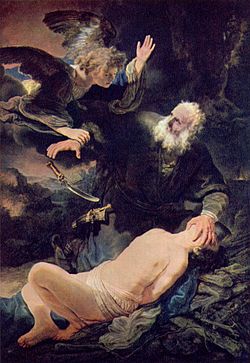
Theme: The bigger the sacrifice, the greater the miracle
2nd Sunday of Lent
Some Businessmen and women say that ‘the bigger the risk, the higher the returns’ (on the investment). For instance, if one saves his/her GHc 1,000.00 in a risk free savings account in a bank in Ghana at an interest rate of 5% per annum he/she gets a return of only GHc 50.00 at the end of the year. On the other hand, if he/she takes the risk of investing in some other business, the annual return on the investment may be GHc 2,000.00 or more.
Similarly, the readings of this Sunday of Lent suggest the theme of this homily: ‘the Bigger the Sacrifice, the Greater the Miracle.’
Abram [Abraham] took the risk of leaving his fatherland and his place of comfort, and God blessed him with a new land – the Promised Land. Again, he risked his faith in Yahweh, and he was blessed with a miracle: a son, Isaac, given birth to by the centenarian’s ninety-year old wife, Sarah. Now [according to today’s first reading, Gen. 22], to be blessed with the greater miracle of becoming the father of many nations, Abraham had to take the greater risk of sacrificing his only beloved son, Isaac. Abraham took the risk, and today Jews and non-Jews [including you and I] refer to him as our father in faith.
Similarly behind today’s gospel reading’s story of the transfiguration is the message that ‘the Bigger the Sacrifice, the Greater the Miracle.’ About two-and-half years before the transfiguration, Jesus, at the Sea of Galilee, asked Peter and his colleagues to make a sacrifice: to offer him their boat as a ‘pulpit’ for Jesus [and this was on a bad day of fishing expedition by Peter and co. But they didn’t lament nor tell Jesus off.] They made the sacrifice there, and in the end they enjoyed the miracle of probably the biggest fish catch in their fishing career! [And this happened during the day time and not when it was dark as required for fishing!] Jesus soon asked for another sacrifice: Peter and co were to leave the source of their livelihood and become fishers of MEN. Because they made this bigger sacrifice, they witnessed greater miracles as they followed Jesus: multiplication of loaves, sights given to the blind, lame made to walk, the dead raised to life…. But the greatest miracle was yet to come!
The greatest miracle entailed the resurrection of Jesus, the transfiguration of our deaths, Peter and co becoming ‘princes’ in heaven, and all of us becoming citizens of heaven! This required the greatest sacrifice! And only one person could fittingly offer that sacrifice: Jesus, the Son of God; he had to die for our sins. And so about a week before the transfiguration, when Peter had identified Jesus as the Christ, the Son of the Living God, the disciples were told by the Lord of his impending suffering, death and resurrection. The disciples, esp. Peter, could not take in this message. So, on the mount of transfiguration they tasted, for a short while, the glorious miracle which followed the greatest sacrifice! Beloved, because of the greatest sacrifice of Jesus, you and I have access to the greatest miracle: our death shall be transfigured, not for a while, but for eternity, not on an earthly mountain, but in the glorious heaven itself! Let us prepare to celebrate this Easter with a special sense of gratitude to Jesus, and to his Father [who like Abraham offered his only beloved Son], and to the Holy Spirit [who gives us the faith to appreciate and accept these mysteries]! Amen!
By Very Rev. Fr. John Louis

